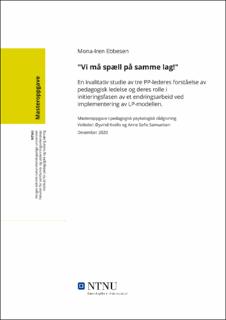Vi må spæll på samme lag!
Master thesis
Permanent lenke
https://hdl.handle.net/11250/2784348Utgivelsesdato
2020Metadata
Vis full innførselSamlinger
Sammendrag
Kravene til pedagogisk-psykologisk tjeneste (PPT) har endret seg i takt med utviklingen av samfunnet, og tjenesten må være i kontinuerlig utvikling for å holde tritt med statlige krav og brukernes og samarbeidspartneres forventninger til tjenesten. Formålet med studien er å undersøke hvilke sentrale faktorer som antas å spille en rolle når PP-ledere skal lede et endringsarbeid i egen tjeneste. Oppgaven bygger på en antagelse om at lederens rolle i endringsprosesser i stor grad påvirker resultatet av arbeidet.
Problemstillingen for studien er: «Hvordan kan PP-ledere gjennom pedagogisk ledelse initiere et endringsarbeid i egen tjeneste, eksemplifisert gjennom initieringsfasen i implementeringen av LP-modellen?» Den teoretiske rammen er faglitteratur om endringsarbeid i virksomheter, pedagogisk ledelse og implementeringsteori.
Det er benyttet kvalitativ metode for å finne svar på problemstillingen. Ved hjelp av intervju med tre PP-ledere samlet jeg empiri, som ble tematisk analysert. Gjennom en deduktiv tilnærming utkrystalliserte tre hovedtema seg: Endringsarbeid, Pedagogisk ledelse og Initiering. Temaet Pedagogisk ledelse har undertemaene Ledelse, Lærings- og refleksjonsprosesser og Relasjonelle forhold. Temaet Initieringsfasen omfatter følgende undertema: Behov for endring og involvering av ansatte, Forpliktelse gjennom felles forståelse og mål, Implementeringsplan, Organisasjonskultur og motstand, og den siste er Aktiv ledelse og roller.
Hovedfunnene er at informantene har en forståelse for at deres oppgave som ledere, er å motivere de ansatte til å delta i implementeringen av LP-modellen. De legger alle til rette for refleksjon blant ansatte i tjenesten, slik at de ansatte får eierforhold til utviklingsarbeidet. Flere av informantene beskriver seg selv som tydelige i sin ledelse, og er bevisst på at motstand kan oppstå i initieringsfasen. De vektlegger å jobbe med motstand gjennom å gi ansatte rikelig med informasjon og rom for felles refleksjon.
Studien viser at alle tjeneste har arenaer for læring og refleksjon, og alle informantene viser at de utøver pedagogisk ledelse i et relasjonelt perspektiv, noe som ifølge Wadel (1997) er essensielt når en skal sikre læring og utvikling i virksomheter.
Av uventede funn var det én informant som opplevde at LP-modellen var en gavepakke til PPT. Et annet uventet funn var at én informant kun ansetter nye PP-rådgivere som har endringskompetanse. Det kan synes lettere å løfte blikket og tenke utvikling når du er leder for en middels eller stor tjeneste. I små tjenester er ofte PP-leder også PP-rådgiver, og mye av arbeidstiden går til elev- og system-oppgaver, dette kan gi lite tid for tanker om tjenesteutvikling.
Studien viser videre at alle informantene besitter alle rollene, som Senge og Lillebø (1999) mener er nødvendige å ha for en leder i endringsarbeid, henholdsvis som konstruktør, lærer og tilrettelegger.Det ser ut til at grunnlaget for implementeringen av et endringsarbeid legges i initieringsfasen, og det er av stor betydning hvordan PP-leder «forvalter» rollen som leder. The requirements for Norwegian educational-psychological service (PPT) have changed in line with the development of society, and the service must be in continuous development to keep pace with government requirements, and users and partners expectations of the service. The purpose of the study is to investigate which key factors are assumed to play a role when PP-leaders (educational-psychological leaders) are to lead a restructuring in their own service. The thesis is based on an assumption that the leader's role in change processes greatly affects the result of the work.
The problem for the study is: "How can PP-leaders, through pedagogical leadership, initiate a restructuring in their own service, exemplified through the initiation phase in the implementation of the LP model?"The theoretical framework is professional literature on restructuring in companies, pedagogical management and implementation theory.
A qualitative method has been used to find answers to the problem. Using interviews with three PP-leaders, I collected empirical data, which was thematically analyzed. Through a deductive approach, three main topics crystallized: Restructuring, Pedagogical Leadership and Initiation. The topic Pedagogical Leadership has the subtopics Leadership, Learning and Reflection Processes, and Relational Conditions. The topic Initiation Phase includes the following subtopics: Need for change and involvement of employees, Commitment through common understanding and goals, Implementation plan, Organizational culture and resistance, and the last one is Active management and roles.
The main findings are that the informants have an understanding that their task as managers is to motivate the employees to participate in the implementation of the LP model. They all facilitate reflection among employees in the service, so that the employees gain ownership of the development work. Several of the informants describe themselves as clear in their management and are aware that resistance can arise in the initiation phase. They emphasize working with resistance by providing employees with plenty of information and common reflection.
The study shows that all services have arenas for learning and reflection, and all the informants show that they exercise pedagogical leadership in a relational perspective, which according to Wadel (1997) is essential when ensuring learning and development in companies.
Of unexpected findings, one informant experienced that the LP model was a gift package to PPT. Another unexpected finding was that one informant only hires new PP-advisers who have restructuring competence.It may seem easier to look up development when you are the leader of a medium or large service. In small services the PP-leader is often also the PP-advisor, and much of the working time goes to student and system tasks, and little time for thoughts on service development. The study further shows that all the informants hold all the roles, which Senge and Lillebø (1999) believes are necessary for a leader in change work, respectively as a constructor, teacher and facilitator.
It seems that the basis for the implementation of a restructuring is laid in the initiation phase, and it is of great importance how the PP-leader "manages" the role as leader.
